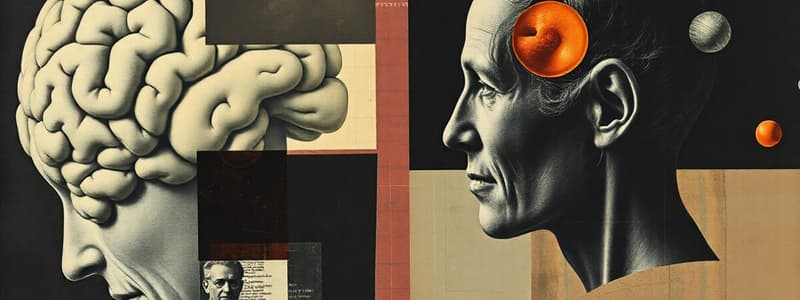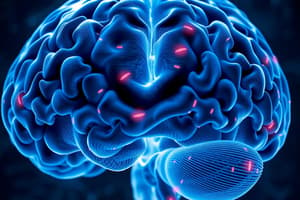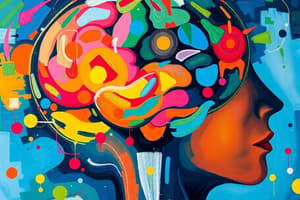Podcast
Questions and Answers
Which medication is NOT typically used to treat psychotic symptoms and delirium?
Which medication is NOT typically used to treat psychotic symptoms and delirium?
- Haloperidol
- Risperidone
- Clothiapine
- Lithium (correct)
According to the diagnostic criteria, which of the following is NOT a major Neurocognitive Disorder?
According to the diagnostic criteria, which of the following is NOT a major Neurocognitive Disorder?
- Multiple Sclerosis (correct)
- Frontotemporal Degeneration
- Alzheimer's Disease
- Lewy Body Dementia
In the context of Major Neurocognitive Disorders (NCD), what does the term 'behavioral disturbance' primarily refer to?
In the context of Major Neurocognitive Disorders (NCD), what does the term 'behavioral disturbance' primarily refer to?
- Impaired memory and cognitive function.
- Problems with physical mobility and coordination.
- Presence of psychotic symptoms, mood changes, agitation, or apathy. (correct)
- Difficulties with instrumental activities of daily living.
What is the primary focus when using antipsychotics for patients with delirium?
What is the primary focus when using antipsychotics for patients with delirium?
What is the level of required monitoring for a patient with delirium?
What is the level of required monitoring for a patient with delirium?
What is the primary characteristic of a neurocognitive disorder?
What is the primary characteristic of a neurocognitive disorder?
Which of the following best describes the nature of cognitive deficits in major neurocognitive disorders?
Which of the following best describes the nature of cognitive deficits in major neurocognitive disorders?
What is the relationship between brain networks and neurocognitive disorders?
What is the relationship between brain networks and neurocognitive disorders?
Which of the following is a core criterion for diagnosing delirium?
Which of the following is a core criterion for diagnosing delirium?
What is a defining characteristic of the 'acute' specifier for delirium?
What is a defining characteristic of the 'acute' specifier for delirium?
If a patient's cognitive function is described as being like 'cheese with holes', what does this metaphor primarily refer to?
If a patient's cognitive function is described as being like 'cheese with holes', what does this metaphor primarily refer to?
In the context of cognitive domains, what does the term ‘inflexibilities or deficits’ signify?
In the context of cognitive domains, what does the term ‘inflexibilities or deficits’ signify?
According to the information provided, what is the typical long-term trend for cognition in major neurocognitive disorders?
According to the information provided, what is the typical long-term trend for cognition in major neurocognitive disorders?
What is the primary focus when treating delirium?
What is the primary focus when treating delirium?
Which characteristic is NOT a typical manifestation of delirium?
Which characteristic is NOT a typical manifestation of delirium?
When managing delirium, what does the acronym 'DIMITOP' represent?
When managing delirium, what does the acronym 'DIMITOP' represent?
When should benzodiazepines be avoided in managing a patient with delirium?
When should benzodiazepines be avoided in managing a patient with delirium?
Which of these is NOT a recommended nursing intervention for a patient with delirium?
Which of these is NOT a recommended nursing intervention for a patient with delirium?
What is the most important factor for healthcare staff to remember when using medication to manage a patient's behavior?
What is the most important factor for healthcare staff to remember when using medication to manage a patient's behavior?
Which of the following is a key element to consider when diagnosing delirium?
Which of the following is a key element to consider when diagnosing delirium?
What is NOT a recommended element of general management guidelines for delirium?
What is NOT a recommended element of general management guidelines for delirium?
Which behavioral manifestation is MOST commonly observed in individuals with neurocognitive disorder?
Which behavioral manifestation is MOST commonly observed in individuals with neurocognitive disorder?
What percentage of individuals with neurocognitive disorder experience delusions?
What percentage of individuals with neurocognitive disorder experience delusions?
Which of the following is a common thought content manifestation in neurocognitive disorder?
Which of the following is a common thought content manifestation in neurocognitive disorder?
Compared to depressive symptoms, mania is considered with neurocognitive disorder?
Compared to depressive symptoms, mania is considered with neurocognitive disorder?
Disorientation in neurocognitive disorder most closely relates to which factor?
Disorientation in neurocognitive disorder most closely relates to which factor?
What is meant by 'bad cop decisions' in the context of managing neurocognitive disorder?
What is meant by 'bad cop decisions' in the context of managing neurocognitive disorder?
Which of these is considered a symptom of perceptual disturbance?
Which of these is considered a symptom of perceptual disturbance?
How does the severity of neurocognitive disorder impact thought content?
How does the severity of neurocognitive disorder impact thought content?
What is the MOST frequent sleep disturbance noted in those with neurocognitive disorder?
What is the MOST frequent sleep disturbance noted in those with neurocognitive disorder?
What percentage of individuals with neurocognitive disorder experience sexual disinhibition?
What percentage of individuals with neurocognitive disorder experience sexual disinhibition?
Flashcards
What is a neurocognitive disorder?
What is a neurocognitive disorder?
A neurocognitive disorder is a medical condition that affects the cognitive processes of the brain like memory, language, thinking, attention, and executive functioning.
What are cognitive domains?
What are cognitive domains?
Cognitive domains are specific areas of cognitive functioning, such as memory, language, attention, executive functioning, and visuospatial ability.
What happens when there are inflexibilities or deficits in cognitive domains?
What happens when there are inflexibilities or deficits in cognitive domains?
Inflexibilities or deficits in cognitive domains can mean that a person has problems adapting to new situations or interacting effectively with their environment.
What is integrated cognitive function?
What is integrated cognitive function?
Signup and view all the flashcards
What is delirium?
What is delirium?
Signup and view all the flashcards
Why is delirium concerning?
Why is delirium concerning?
Signup and view all the flashcards
What are predisposing and precipitating factors for delirium?
What are predisposing and precipitating factors for delirium?
Signup and view all the flashcards
What are the DSM-5 criteria for delirium?
What are the DSM-5 criteria for delirium?
Signup and view all the flashcards
When to use antipsychotics for NCDs?
When to use antipsychotics for NCDs?
Signup and view all the flashcards
Why is Delirium an Emergency?
Why is Delirium an Emergency?
Signup and view all the flashcards
What is a Major Neurocognitive Disorder? (NCD)
What is a Major Neurocognitive Disorder? (NCD)
Signup and view all the flashcards
Name some conditions that can cause Major NCD.
Name some conditions that can cause Major NCD.
Signup and view all the flashcards
What are the severity levels of a Major NCD?
What are the severity levels of a Major NCD?
Signup and view all the flashcards
Delirium: Core Features
Delirium: Core Features
Signup and view all the flashcards
Delirium: Key Distinguishing Features
Delirium: Key Distinguishing Features
Signup and view all the flashcards
Delirium Treatment: Primary Goal
Delirium Treatment: Primary Goal
Signup and view all the flashcards
Delirium Duration
Delirium Duration
Signup and view all the flashcards
Delirium: Contributing Factors
Delirium: Contributing Factors
Signup and view all the flashcards
Delirium Management: Key Strategies
Delirium Management: Key Strategies
Signup and view all the flashcards
Delirium Management: Benzodiazepines
Delirium Management: Benzodiazepines
Signup and view all the flashcards
Delirium Management: Antiepileptics
Delirium Management: Antiepileptics
Signup and view all the flashcards
What is a Neurocognitive Disorder (NCD)?
What is a Neurocognitive Disorder (NCD)?
Signup and view all the flashcards
How are NCDs Classified?
How are NCDs Classified?
Signup and view all the flashcards
What is Aggression in NCDs?
What is Aggression in NCDs?
Signup and view all the flashcards
What is Wandering in NCDs?
What is Wandering in NCDs?
Signup and view all the flashcards
What is Overeating in NCDs?
What is Overeating in NCDs?
Signup and view all the flashcards
What are Hallucinations and Illusions in NCDs?
What are Hallucinations and Illusions in NCDs?
Signup and view all the flashcards
What is Disorientation in NCDs?
What is Disorientation in NCDs?
Signup and view all the flashcards
What are Sleep Disturbances in NCDs?
What are Sleep Disturbances in NCDs?
Signup and view all the flashcards
What are Appetite Changes in NCDs?
What are Appetite Changes in NCDs?
Signup and view all the flashcards
What is Symptomatic Treatment in NCDs?
What is Symptomatic Treatment in NCDs?
Signup and view all the flashcards
Study Notes
Neurocognitive Disorders
- Neurocognitive disorders are illnesses affecting cognition
- Cognitive functions are abnormally affected, whether permanently or temporarily
- Abnormalities appear in cognitive domains
Cognitive Domains
-
Complex attention
-
Executive function
-
Learning and memory
-
Language
-
Perceptual-motor
-
Social cognition
-
Cognitive deficits can be acute, chronic, or acute on chronic
-
Deficits in these domains inhibit rational interaction with the environment
-
Cognitive function becomes fragmented like a 'holey cheese'
-
Major neurocognitive disorders show gradual deterioration, while delirium is acutely severe
Examples of Functions in Brain Regions
- NA (nucleus accumbens): delusions, hallucinations, pleasure, interest, libido, fatigue, euphoria, reward, motivation
- PFC (prefrontal cortex): executive function, attention, concentration, emotions, impulses
- BF (basal forebrain): memory, alertness
- S (striatum): motor function, relay site from PFC
- T (thalamus): pain, alertness, sensory input to and from cortex
- H (hippocampus): memory, re-experiencing events
- A (amygdala): negative symptoms, fear, guilt, sleep, appetite, anxiety, suicidality, endocrine
- C (cerebellum): motor function
- SC (spinal cord):
- NT (brainstem neurotransmitter centers):
At the Synaptic Level
- Neurocognitive disorders are caused by insults
- Deficits or toxicities in neurotransmitters
- Diffuse neuronal injury (internal/external)
- Loss/destruction of neuronal mass
- Neuronal toxicity/damage (encephalopathies)
- Electrolyte imbalances
Delirium (The Acute Syndrome)
- Delirium is an acute cerebral insufficiency caused by widespread disruption of cerebral metabolism (encephalopathy)
- A medical emergency requiring identification and treatment
- Often mistaken for psychosis, leading to missed diagnoses
- Characterized by fluctuating awareness & attention, and additional cognitive disturbances (memory, language, perception)
- Treatment focuses on treating the underlying cause
Risk Factors for Delirium
- (Predisposing):*
- Age >75 years
- Dementia/baseline cognitive impairment
- Male
- Depression
- Functional dependence
- Malnutrition
- Substance abuse
- Visual/hearing impairment
- Comorbidities/severe illness
- (Precipitating):*
- Acute infection
- Polypharmacy/psychoactive drugs/sedatives
- Catheterization
- Electrolyte imbalances
- Hospitalization
- Major procedures
- Low albumin
DSM-V Criteria for Delirium
- A. Disturbance in attention and awareness
- B. Disturbance develops quickly, fluctuates in severity, and represents a change from baseline
- C. Additional disturbance in cognition (e.g., memory, disorientation, language, visuo-spatial ability, perception)
- D. Disturbances are not better explained by another neurocognitive disorder or severe reduced arousal (coma)
- E. Evidence from history, exam, or lab findings of a medical condition/substance intoxication/withdrawal/toxin exposure/multiple etiologies as the causality of the symptoms
Specifiers for Delirium
-
Substance intoxication/withdrawal
-
Medication-induced
-
Due to another medical condition
-
Due to multiple etiologies
-
Activity levels can be hyperactive (agitation, mood lability, refusal to cooperate) or hypoactive (sluggishness, lethargy approaching stupor) or mixed.
Problematic Domains in Delirium
- Mood symptoms: hypomania, irritability, lability
- Psychotic symptoms: disorganized behavior, thoughts, hallucinations, delusions, mutism
- Behavioral problems: negativism, aggression, wandering
Parting Comments on Delirium
- NCD: chronic/insidious onset, clouded consciousness in late stages, normal arousal, deteriorating course, common in geriatrics (nursing homes)
- Delirium: acute/rapid onset, clouded fluctuating consciousness, agitation/stupor, reversible, common in medical/surgical/neurological wards
Principles of Treatment
- Identify the underlying cause (blood work, e.g. FBC, DiFF, SMAC, TFT, RPR, HIV, folate, B12, dipstick, LP IF indicated)
- Address reversible factors (iron def., malnutrition, COPD hypoxia, hypotension, infections, etc)
Symptomatic Management
- Control behaviors in severely agitated patients
- Use appropriate agents (e.g. haloperidol, benzodiazepines, clozapine, etc.)
- Start low and titrate carefully
- Avoid abrupt discontinuation
Other Management Guidelines
- Safe environment (quiet, well-lit room)
- Consistent observation and vital function monitoring
- Clear reminders regarding family/place/time
- Use minimal medication
- Be aware of co-morbidities
Diagnostic Criteria Major NCD
- Significant cognitive decline (one or more domains)
- Substantial impairment, preferably through standardized testing or other quantified assessment
- Interference with daily living activities (e.g., instrumental activities)
- Not occurring exclusively in delirium
- Not better explained by another mental disorder, like MDD or schizophrenia
Conceptual Explanation of MNCD
- Syndrome clinically recognizable but potentially due to multiple underlying etiologies
- Specifiers:
- -With behavioral disturbances (psychotic, mood, agitation, apathy)
- -Without behavioral disturbances
Manifestations of NCD
- Behavior: Aggression, wandering, overeating, hyperorality, incontinence, sexual disinhibition
- Thought Content: Delusions, form of thought.
- Emotions/Mood: Depression, mania, rarer.
- Perceptions: Hallucinations, illusions, perceptual dysfxn
- Sleep: Insomnia
- Appetite: Changes
Treatment of Major Neurocognitive Disorders (MNCD)
- Identify the etiological subtype (e.g., Alzheimer's)
- Basic blood tests and/or specialist investigations (CSF for amyloid beta and tau in Alzheimer's)
- Optimize reversible risk factors (e.g., iron deficiency, malnutrition, hypoxia, hypotension)
Symptomatic Treatment of Major NCDs
- Behaviour problems: therapeutic program, family collaboration, and possible acute sedation.
- Aggression: behaviour therapy, sedative if needed
- Delusions/hallucinations: low-dose antipsychotics (haloperidol, risperidone, olanzapine)
- Depression: medication for major MDD if evident, avoid anticholinergic meds
- Anxiety: prescribe only if full syndrome present, avoid benzodiazepines
Proper Medical Treatment of MNCDs
- Proper physical and neurologic examination
- Use of acetylcholinesterase inhibitors (Donepezil, Rivastigmine, Galantamine) are often useful in Alzheimer's disease and related disorders.
- Trial for 8 weeks often needed in vascular NCD or Parkinson's NCD to test if memory/verbal fluency improves
Treatment for Behavioral and Psychological Symptoms of Dementia (BPSD)
- Use lower dosages of psychotropics
- Start with low doses gradually
- Avoid abrupt discontinuation of medication
- Be mindful of co-morbid meds/drug-drug interactions.
Studying That Suits You
Use AI to generate personalized quizzes and flashcards to suit your learning preferences.




